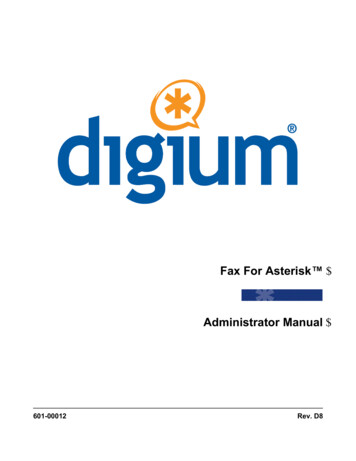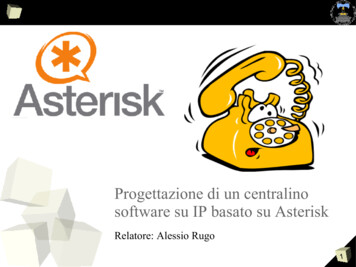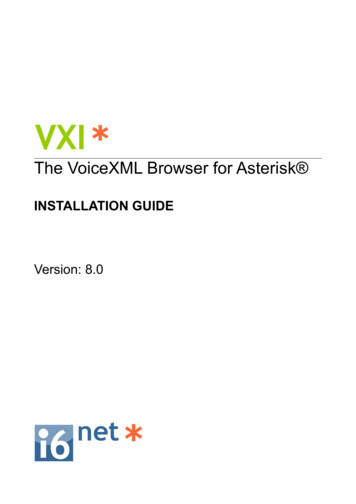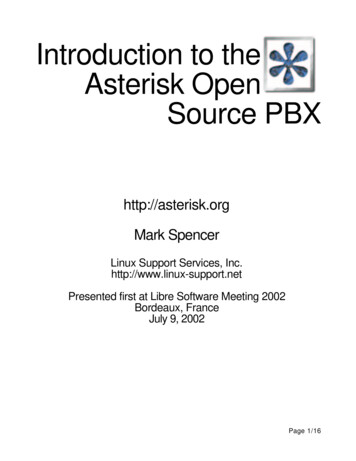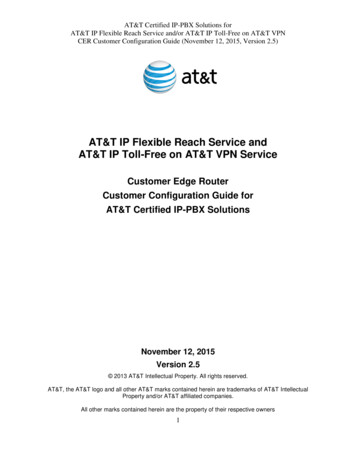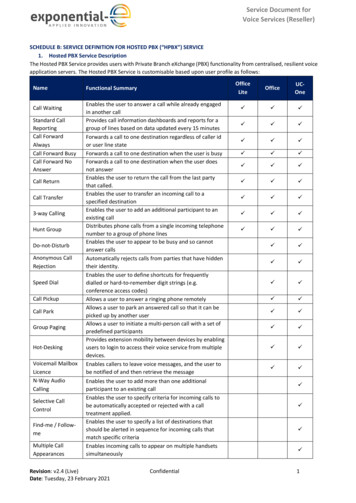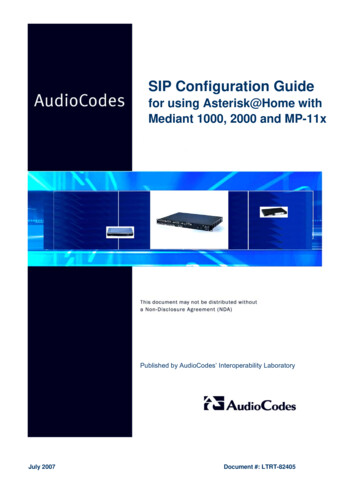
Transcription
Asterisk Open Source PBX/iPBXAdvanced UsagePresented by:Nir SimionovichDimiTelecom Ltd
About Dimi TelecomEstablished 2002, Dimi Telecom has been operatingin the Telecom Market as a VoIP retail & wholesaleprovider.Since 2003, Dimi Telecom has been heavily involvedin the Asterisk and GnuGK Open Source projects.Dimi Telecom is currently Digium’s Gold Reseller inIsrael.Dimi Telecom currently operates Tier-1 installationsof Asterisk based appliances.
What are we going to talk about?Voice Over IP Primer––Signaling ProtocolsCodecsVoice Over IP and Asterisk–––H323 (chan h323)SIP (chan sip)IAX (chan iax2)The NAT Traversal problemThe Asterisk Application Gateway Interface (AGI)–––AGI Programming BasicsAGI Simple ExamplesAGI Execution Flow and the DeadAGI conceptQuestions and Answers
Voice Over IP – VoIP for short
A Primer to Voice Over IPVoice Over IP (VoIP) can be described as the abilityto sample voice transmissions, packet them into wellknown chunks, and transmitting them over an IPnetwork.VoIP traffic is split into 2 network transmission types:Signaling and RTP. Signaling is usually TCP based,while RTP is UDP based.Signaling is usually performed between well knownTCP ports (h323:1720, SIP:5060), while RTP usesrandomly assigned UDP ports.
VoIP Signaling: H323H.323 is the international standard for multimediacommunication over packet-switched networks, including LANs,WANs, and the Internet. It was first defined by the ITU in 1996and has been updated regularly. The most recent version isH.323 version 5 (2003).H.323 was the world market leader for transporting voice andvideo around the world, with literally billions of minutes ofvoice/video traffic every month alone.H.323 is a binary stream based protocol, which means thatinteroperability between vendors is hard, at times evenimpossible. This is caused by the various H323 versionimplementations of vendors.
VoIP Signaling: Session InitiationProtocol (SIP)The Session Initiation Protocol (SIP) is the IETF standard forthe establishment of multimedia sessions. These sessionsmight be used for audio, video, IM, or other real-time datacommunication sessions.The scope of SIP is relatively broad, including theestablishment of virtually any kind of "session" between twoparties. SIP is also entirely independent of the underlyingtransport, though TCP and UDP are used almost exclusively.Unlike its counter part, H323, SIP isn’t a binary stream signalingprotocol. SIP signaling is very similar to the HTTP protocolstandard, which makes it highly inter-operable betweenvendors.Although H323 is the more common one, SIP is slowlybecoming a more dominant option.
VoIP Signaling: Inter AsteriskExchange (IAX)IAX is the de-facto standard VoIP protocol for Asterisk networking.Perhaps its most impressive feature is its transparent interoperationwith NAT and PAT (IP masquerade) firewalls, including placing,receiving, and transferring calls and registration.IAX is extremely low-overhead (four bytes of header, as compared toat least 12 bytes of header for RTP based protocols like SIP andH.323). IAX control messages are also substantially smaller.IAX supports internationalization, permitting the requesting PBX orphone to receive content from the providing PBX in its preferredlanguage if available.Supports authentication on incoming and outgoing calls (BorderControl).Using IAX dialplan polling, the dialplan for a collection or cluster ofPBX's can be centralized, with each PBX only needing to know itslocal extensions.Unlike its counterparts, IAX can support trunking, giving a betterperformance per Kbps ratio.
Codecs: Voice Coders, what’savailable and for what price?Asterisk provides internal support for the following codecs:CodecKbpsQualityG711alaw64 KbpsPhoneG711ulaw64 KbpsPhoneLinear 16bit128 KbpsPhoneADPCM32 KbpsPoor qualityGSM 6.1013 KbpsCellular PhoneLPC-102 KbpsMr. RobotoiLBC13 KbpsCellular PhoneAsterisk also supports g729 via purchase of a licensed codec module,either from Digium or directly from VoiceAge. G723.1 is supported aspass-through only.
H323: chan h323 and chan oh323H323 support is not native to Asterisk, and is provided viaexternal channel modules.The 2 available modules are: chan h323 provided by JeremeyMcNamera and chan oh323 provided by InAccess Networks.Both channels are based upon the OpenH323 stack.Both channels use the same RTP stack, provided by Asterisk.chan h323 is slightly easier to install than chan oh323, whichrequires various patches to the OpenH323 stack.chan h323 provides better control for incoming and outgoingcall control. chan oh323 reminds very much the Cisco mannerof managing VoIP dial-peers.Both channels are in constant development and testing, andare known to work in production environments around theworld.Use what ever you feel more comfortable with!
H323: Known issuesAs H323 is a byte stream based signaling protocol, and it’scurrently at version 4, inter-operability issues may occur.chan h323 had been known to cause problems with someversions of Cisco IOS, while chan oh323 is known to causeproblems with other versions.As support for H323 is rendered via externally shared libraries,both channels suffer from an instability factor.The instability would usually end up in one of the followingscenarios: Asterisk crashes with a nice core-dump to send tothe programmers, Asterisk becomes non-responsive due tochannel dead-locks.In the latter case, Asterisk will remain responsive to the CLI, butwill not handle any calls.Personal Recommendation: use only if you must, avoid if notneeded.
SIP: chan sipSIP support is developed as a standard channel that isprovided with Asterisk.In comparison to H323, SIP is much more stable and interoperable.SIP inter-operability had been achieved with Cisco, SNOM,GrandStream, Veraz, Sonus and more vendors.Asterisk supports SIP as a SIP registrar or a SIP agent.With the availability of SIP phones everywhere, SIP isbecoming the protocol of choice for iPBX installations.Asterisk supports SIP clients that are located behind a NAT or aPAT network.The Asterisk SIP stack can operate behind a NAT firewall,seamlessly.Real-Time configuration of peers and clients is available via aninternal resource.
SIP: chan iax2IAX is the de-facto standard for Inter AsteriskExchange.IAX is a proprietary signaling protocol, and does notinter-operate with other vendor devices.IAX soft phones and IAX VoIP phone are available.IAX support is developed as a standard channel thatis provided with Asterisk.Asterisk can operate as an IAX registration server oras a SIP UA.IAX is operates seamlessly behind NAT and PAT.
The issue with NAT traversalBoth SIP and H323 suffer from a lack of proper support for NATtraversed networks.The problem is sourced at the fact that both protocols rely ondynamic port allocation for RTP transmission (Voice).H323 handles the issue of NAT traversal with H323 Proxyservers. SIP handles NAT traversal via utilizing STUN servers,or via firewall piercing techniques.The above mentioned solution cause problems whendebugging configuration in case of problems.NAT traversed networks make up for about 95% of the officeand home networks around the world – for that NAT/PAT is aserious problem when deploying VoIP networks.
Asterisk H323: NAT traversal handlingBoth chan h323 and chan oh323 DO NOT handleany form of NAT traversal handling.For H323, NAT traversal can be achieved by utilizingan externally installed GateKeeper in Proxy mode.The GnuGK project (www.gnugk.org) can operate asa NAT Proxy for H323.The GateKeeper is required to be installed on thenetwork itself.The solution is hard to manage, and would usuallyprove un-reliable.
Asterisk H323: To GK or not to GKUsing an H323 gatekeeper is not a must, but should weuse one?––––An H323 gatekeeper as a NAT proxy device for an H323 enabledVoIP network.When your H323 gateway doesn’t support complex routing ruleswell.When the number of routing r
SIP support is developed as a standard channel that is provided with Asterisk. In comparison to H323, SIP is much more stable and inter-operable. SIP inter-operability had been achieved with Cisco, SNOM, GrandStream, Veraz, Sonus and more vendors. Asterisk supports SIP as a SIP registrar or a SIP agent.

